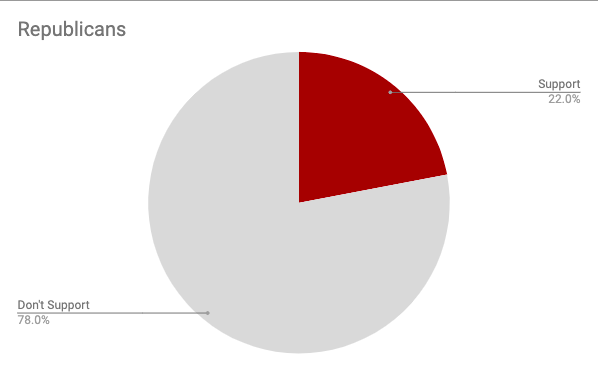Impeachment 101: Understanding the Impeachment

22% of the Republican college students participating in the Axios/College Reaction Poll voted saying that they support the impeachment inquiry into President Trump.
The impeachment of President Donald Trump is in full swing as senators continue to submit questions to impeachment managers and lawyers for President Trump.
Starting Friday, senators will begin a debate over the inclusion of further documents and witnesses in the trial. However, for many Americans, there is still confusion over what the impeachment actually is and what the trial actually means for the current and future presidencies.
The majority of Americans surveyed in a Business Insider poll did not understand how impeachment works, with only 30% of those surveyed correctly defining the term. However, professors like Christopher Banks urge voters to be knowledgable of the process.
“Voters should be in tune and put aside the boring argument of ‘just politics,’” Banks said.
Despite party polarization, college students are more likely than adults to support impeachment. About one in five, or 22%, of college Republicans, favor the inquiry, according to Axios/College Reaction Poll.
Banks teaches graduate courses in American politics, terrorism and human rights and law, justice and society. Before receiving his doctorate, he practiced civil and criminal litigation. He is also the author of ‘The Judicial Process: Law, Courts and Judicial Politics’ that introduces students to the nature and role of the judicial process in the United States.
“When I ask students in class why the impeachment is important, most stay silent,” said Banks. “People don’t want to say what their opinion is, especially Trump supporters.”
Trump’s impeachment is born into an era of hyper-partisanship, polarization and a more absolute form of party alignment. There are many differences in how the current impeachment trial is being executed compared to the past election, including the charges being pressed.
“The main differences to understand in each impeachment is who, how they’re being charged, allegations and the nature of political partisanship,” Banks said.
There were three presidents impeached so far throughout U.S history. Clinton was impeached on the grounds of obstruction of justice, due to him lying about his affair with Monica Lewinsky when asked by members of Congress.
Andrew Johnson was impeached for high crimes and misdemeanors for firing Secretary of War Edwin M. Stanton and replacing him with Ulysses S. Grant.
Donald Trump was impeached by the House of Representatives in 2019 for abusing his power as president by withholding military aid from Ukraine in order to gain information on a political opponent for his own personal benefit and obstructing Congress.
“With Trump, the House Judiciary Committee independently came up with their version of the acts that alleged abuse of power and obstruction,” Banks said.
Thursday marked the final day to ask questions of President Trump’s lawyers and House managers. Today, the crucial debate over the inclusion of witnesses in the trial starts. The New York Times revealed that the recently published book written by John Bolton, former national security advisor, detailed a particular conversation with Trump about the aid to Ukraine. If witnesses are allowed, Bolton could be called to testify.
“The overlap over Bolton’s book release and the impeachment is certainly not a coincidence,” said Banks.
It is unclear when closing arguments will happen. If the trial does not conclude on Friday, then the vote will most likely take place on Saturday.
“If we don’t check the president, what is an impeachable offense in the future?” Banks said. “I hope people really look at it for what it really is.”
Annie Zwisler covers politics. Contact her at [email protected].


